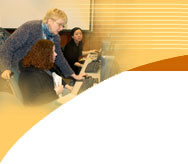

Our language evolves with increased awareness, sensitivity to the impact that words can have on attitudes, and the impact of the media on our self-esteem. The language or choice of words has evolved in relation to the awareness we have that individuals who have disabilities are equal contributors and partners in our society as anyone without a disability. Avoid using the word “handicapped”.
Avoid putting the word “the”
before the term for the disability: the blind, the deaf, the crippled,
the disabled. Avoid using “victim” or “sufferer” |
Eligibility
for Students | Referral
of a Student | Syllabus
Statements | Guidelines
for Faculty
Web
Construction and ADA Guidelines | Extension
Policies | Language
of Disability
Reasonable
Accommodations by Disability | Project
Success Workshops
Eligibility for Services | Prospective Students | Current Students | Faculty and Staff
Policy on Disability | Resources | FAQ's | Glossary